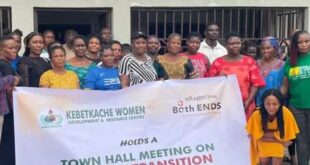By Joel Anekwe
As the much awaited cleanup of Ogoniland is set to commence, a civil society organisation, Civil Society Legislative Advocacy Center (CISLAC) has called on the Hydrocarbon Pollution Remediation Project (HYPREP) to ensure adequate monitoring and reporting of the process to ensure a thorough job is done.
Rising from a one day stakeholders training on Environmental, Social, Human Rights and Gender Impact Assessment (ESHRIA) Towards Sustainability and Management in the Cleanup organised in Port Harcourt at the weekend CISLAC stressed the need to engage environmental monitors because they have the experience to monitor the cleanup process.
Programme Manager of CISLAC, Salaudeen Hashim, speaking on the essence of the training said he believed that monitoring and reporting the process would be a major gap, “if it is not conclusively taken on board from the beginning.”
“So we thought that monitoring and reporting the process is very essential. It is very important because there are quite a lot of challenges that might follow as the cleanup begins”, he added.
Hashim stated that having a clear understanding alongside the community on what is going on daily basis would provide the CSOs and people the opportunity to advocate for some levels of change, adding ” this event will provide skills for the people a different levels, particularly the communities to be able to engage, monitor and provide some complimentary role for government on the cleanup process.”
The CISLAC programme manager further said: “Beyond the fact that we are developing capacity, awareness, getting citizens to participate and be involved, it is also to de-escalate crisis that might occur during the process and also reduce the level of re-pollution that might occur the process.”
Speaking on the absence of emergency measures and building of the Integrated Soil Management Centre, he said that the 8 emergency measures must not be neglected in the process of the cleanup.
He explained: “Even if we have not got the desired result on that, we don’t want the clean up to delay further and that’s why we said you can combine the roles. Once you are doing the cleanup, you can also be providing the emergency measures alongside. That can also create some mileage in terms of how you move on the entire process because if we continue to insist doe do the cleanup, wait and start the emergency measures, then we are creating a setback.”
Celestine Akpobari, an environmental activist and member of the governing board of HYPREP while speaking on the topic “HYPREP and the KPIs: Emerging issues with the cleanup and identifying key challenges and proffering action based response to the identified gaps” painted a grim picture of life of the common man in Ogoniland.
He noted that as yet, the people were still drinking heavily contaminated water as well breathing polluted air regretting that the situation has made life in the area very short.
Akpobari said: “Life has become so short in parts of the area now that small, small boys are now traditional rulers and that’s a sign that people are no longer living long in the area. Young girls still below 18 years are now attaining accidental menopause.”
“We are in a very terrible mess, as an Ogoni, my concern is how to revive the livelihood of the people. The hope that we have now are on those of us still seated here,” he stated.
 PH Mundial – Port Harcourt Online Newspaper News Across The Region
PH Mundial – Port Harcourt Online Newspaper News Across The Region




